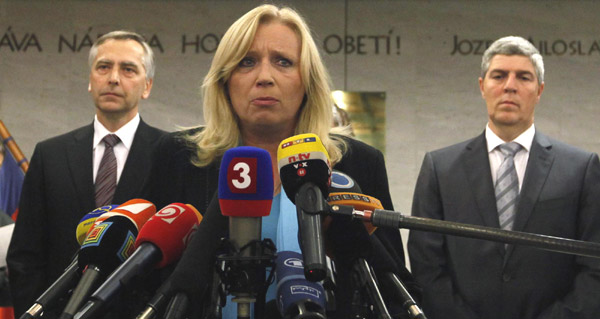Slovakia blocks euro rescue fund
Updated: 2011-10-12 10:53
(Agencies)
|
|||||||||
 |
|
Slovak Prime Minister Iveta Radicova addresses the media after the Slovak Parliament's vote on the euro zone rescue fund tied with Slovak government confidence vote in Bratislava October 11, 2011. [Photo/Agencies] |
BRATISLAVA/ATHENS - The parliament of tiny Slovakia stalled the expansion of a bailout fund to rescue the euro zone from its debt crisis on Tuesday, but international lenders said they were likely to grant a loan to Greece next month, buying time for a broader response.
European Central Bank chief Jean-Claude Trichet said the debt crisis had become systemic and must be tackled decisively.
Slovakia is the only country in the 17-member currency zone that has yet to approve giving new powers to the European Financial Stability Fund. The expansion was agreed by euro zone leaders in July but must be ratified by each country.
The EFSF is Europe's main weapon to respond to a debt crisis that threatens the European common currency, the region's banks and potentially the global financial system.
The government of Slovak Prime Minister Iveta Radicova fell on Tuesday after a small party in her ruling coalition refused to back the plans. The outgoing government still expects to be able to enact the measure as a caretaker administration by the end of this week with support from an opposition party.
"There is an assumption that the EFSF, one way or the other, will be approved by the end of the week," Finance Minister Ivan Miklos told parliament ahead of the vote.
The failure in the Slovak parliament underlines the difficulty of forging a united response to the worsening debt crisis in a currency zone where all 17 member states must act in concert, and voters are increasingly angry at the growing costs.
Leaders are struggling to find a response that would protect euro zone banks if Greece defaults on its debts.
For now, Athens needs an immediate infusion of cash within weeks just to meet state payrolls. A loan programme has been held up while the European Union and IMF assess whether Greece is doing enough to get its finances in order.
After a weeks-long review of Greece's finances, inspectors from the European Union, IMF and European Central Bank, known as the troika, said an 8 billion euro loan tranche should be paid in early November. It still requires approval by euro zone finance ministers and the IMF.









